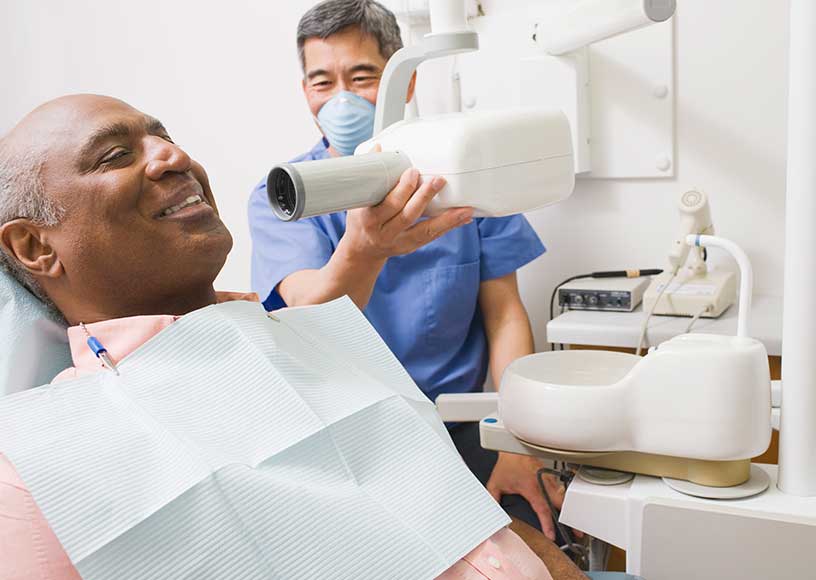Why good dental care is important to your overall health

A great smile can do so many things. It can light up the room. It can win over new friends. And it can reveal a lot about your health, both inside the mouth and throughout the body. The key to keeping that great smile is taking care of your teeth. That means brushing and flossing, of course — and seeing the dentist at least every 6 months for preventive care.
Otherwise, you could put yourself at risk of dental problems. Dentists now think there’s a link between cavities, tooth decay, gum disease and chronic health problems, including diabetes and heart disease.1 Learn about the connection and how to help safeguard your health.
3 common dental problems for adults
Many things contribute to dental issues, including your age and your lifestyle habits, including drinking and smoking.2 But so can skipping or putting off dental checkups.2
Here are some potential problems that may be avoided with routine checkups:
Gum disease
“Initially, your gums will become inflamed, red and swollen, and they’ll bleed while brushing,” says Fatima Khan, D.M.D., a dentist with Altus Dental in Houston. And as the disease progresses, bacteria can get below the gumline and break down the tissue and bone surrounding your teeth, she adds.
With time, the gums can pull away from the tooth. About 42% of adults ages 30 and older have gum disease, also known as periodontitis.3 And that increases to about 68% in people 65 years and older.4
Dry mouth
As we get older, we may make less saliva, says Dr. Khan. That might not seem like a serious problem. But it can be. We need a healthy amount of saliva to keep our mouths lubricated and to neutralize the acids that can attack the teeth, she adds. Without enough saliva, it’s easier for acid produced by bacteria in the mouth to stick around and cause tooth decay.5
Tooth decay and cavities
If your teeth have a lot of bacteria, it can combine with food to form a sticky film (known as plaque), which can lead to cavities.1 A cavity is a small hole in the surface of your tooth. Dentists stop the damage by filling it in.
If your dentist doesn’t fill the hole, the tooth decay starts to spread. That can cause infections throughout your body.1 And if the decay is not addressed, your tooth can become unable to be restored and you could lose it.6
The mouth-body connection
Many dental problems are caused by bacteria. And bacteria can go from your mouth into your bloodstream through bleeding gums or infected or decaying teeth, explains Kami Hoss, D.D.S., the chief executive officer of The Super Dentists, a dental practice in San Diego, and the author of If Your Mouth Could Talk.
Once they’re in the bloodstream, bacteria can go everywhere in the body. That produces infections and inflammation, says Dr. Hoss. And that can trigger serious diseases, including the following:
Heart disease and stroke
Gum disease, missing teeth and even bad brushing habits can increase the risk of high blood pressure and stroke, according to the American Heart Association.7 The bacteria can trigger infections in the heart valves, especially if a person already has heart valve disease. And they may also contribute to clogged arteries, increasing the chance of a heart attack.8
Diabetes9
With diabetes, the sugar levels in your blood are high – that means they’re high in your saliva, too. And that leads to more bacteria, increasing the risk of gum disease. But the relationship goes both ways. Having gum disease can raise your blood sugar levels. And that can up the chances of developing diabetes.
Lung infections and kidney disease
People who already have serious diseases can make things worse if they have gum disease and cavities. If a person has chronic obstructive pulmonary disease, including chronic bronchitis, mouth bacteria can cause more infections in weakened lungs.10 Periodontal inflammation from gum disease may also make chronic kidney disease worse in patients with the condition, and potentially put those people at risk of kidney failure.11
Gastrointestinal issues
There are strains of oral bacteria that can affect the health of the GI tract when you swallow, says Dr. Khan. Most of the time, your stomach acid can kill the bacteria. But some strains can get into the intestines. There they can trigger inflammation and an imbalance between good and bad bacteria, she says. And that can lead to inflammatory bowel disease.12
What helps take care of your teeth
- Find a good dentist and go every 6 months for routine care. That will help keep small cavities from turning into bigger (and more expensive) problems.
- Use a soft or extra-soft toothbrush that won’t damage tooth enamel or irritate gums.
- Ask the dentist to recommend a toothpaste that’s right for you. If you’re more prone to getting cavities, a toothpaste with sodium fluoride may help, recommends Dr. Hoss.
- Look for a mouthwash with prebiotics, such as inulin and xylitol, says Dr. Hoss. Those ingredients kill off bad bacteria and help the beneficial ones thrive.
- Don’t smoke. People who smoke have twice the risk of gum disease as those who don’t. And if you already have gum disease, smoking makes it harder for the gums to heal.13
Schedule a routine dental cleaning and checkup. Preventing problems may be easier than treating them. It may also be easier to treat a small cavity or the first signs of gum disease than conditions that have progressed. And that’s something to smile about.
